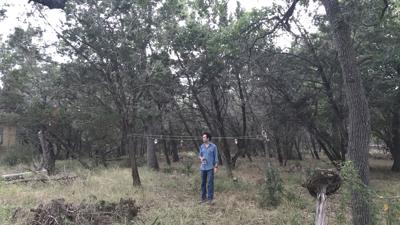At the risk of stating the obvious, Texas singer-songwriter Jerry David DeCicca really put his heart on the (record) sleeve of his latest LP Cardiac Country. No, really — look at it. That’s his heart, literal stitches and all, an artifact of the open-heart surgery DeCicca underwent between recording and mixing his sixth album.
Cardiac Country takes DeCicca’s plain-stated, intimate storytelling and breezy country vibes and pumps out a record of tiny joys and grateful moments. The Scene caught up with DeCicca ahead of his June 18 show at Soft Junk.
The singer-songwriter is driving through Texas hill country south of San Antonio when he answers the phone, fresh off delivering “60 tacos to a school program” he runs. “So yeah, I think I’m doing all right,” DeCicca tells the Scene. “When you have a big health scare, you never know sometimes how your feelings related to that are just aging.”
DeCicca was diagnosed with a heart murmur after returning from the tour for his 2022 album New Shadows, but the diagnosis would change rapidly. The Ohio native returned to the Cleveland Clinic for immediate surgery on a leaky valve. It was a sudden and scary moment for a notably healthy guy in a legendarily unhealthy scene.
“I think part of it is, I was 48 at the time, about to turn 49, when I had the surgery,” he says. “And what symptoms look like are just not traditionally what symptoms look like when you’re ‘younger.’ I recognized my symptoms, but I was assigning it to aging or stress or allergies. I had no idea that I had this issue with my heart. … And then basically I revisited the record a year ago and mixed it and made sense of what the songs were about with a different lens.”
For all the heart talk in American popular music — “My Heart Will Go On,” “Heartbeat — It’s a Love Beat” and the band Heart, just for starters — rarely does the cardiac system take center stage. (The band The Cardiacs being the exception, but also proving my point.) We as a culture don’t often engage with the literal heart and its effects on our art and our lives.
“I think most people that write songs, they understand that when you write a song, you’re oftentimes channeling some part of yourself you don’t understand,” DeCicca explains. “And for me, I guess what it taught was maybe you’re channeling some part of yourself that you don’t understand yet. It’s not just mental and emotional, but can also be physical.
“Even though the connection to my physical health is sort of maybe abstract, it definitely felt like I didn’t understand how the songs fit together at the time, and I do better now,” he continues. “And I’m definitely not a very woo-woo kind of guy, but I’m sort of allowing myself to indulge in this a little bit, I think. I don’t know how else to put it together in terms of what I was feeling before I had any knowledge of what was going on.”
But you don’t need all of this backstory to enjoy the aesthetic delights of Cardiac Country. The album is built from spare instrumentation and sturdy, simple lyrics that get their strength from DeCicca’s keen observation of human nature and its more quotidian moments — like helping a stray dog on “Where Does My Empathy Go,” or the steady, meditative state of good jog on “Long Distance Runner.” Supported by the gorgeous vocals of Eve Searls, Armando Aussenac’s insistent but unobtrusive drumming and the lilting pedal steel of B.J. Cole, Cardiac Country feels like a valley that songs pass through on a sunny morning.
“The one choice I had to make was after I had my surgery and recovered, it was like, ‘Do I want to recut the vocals?’” says DeCicca. “Because I didn’t know at the time that I was running out of breath a little bit, and that was one of my symptoms, and I can hear it on some of the songs. I can definitely hear it. … You can hear it a little bit on some of the other songs, because that’s the main symptom of having a leaky valve, really.”
DeCicca, who has produced records from outsider folk and country artists like Ed Askew and Larry Jon Wilson, has always had a non-normative singing voice that has often featured Dylan-esque vowel stretches. The shortened syllables and pinched notes add unintentional textures that give the songs just a touch of rough-hewn character that highlights the gentleness and humanity that have made DeCicca’s work so wonderful to revisit over the years.
“But then in the end I just decided, ‘You know what?’” says DeCicca. “‘That’s who I was at that time, and I’m going to let it be a record, and I’m going to document that.’”





